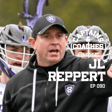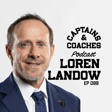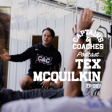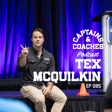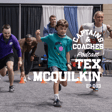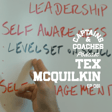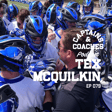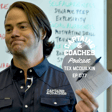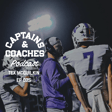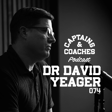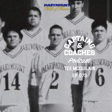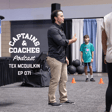Introduction and Guest Welcome
00:00:00
Speaker
people are investing in us and there's consequences and those consequences have a cost and it costs reputation it costs money and the whole point is to like grow something that's ours welcome to the captains and coaches podcast we explore the art and science of leadership through the lens of athletics and beyond i'm your host texman quilkin and today i travel to indiana for a conversation about navigating pivotal transitions and making strategic moves when stakes are the highest.
00:00:30
Speaker
Welcoming back to the show Luke Summers, longtime pal, former colleague, and partner through some of the most transformative chapters of my life. From building training systems and methodologies at Power Athlete,
00:00:43
Speaker
to developing coaching experiences at KidStrong, we've learned what it really means to lead through seasons of change. In part
Breakthroughs and Purpose in Coaching
00:00:51
Speaker
one of this interview, we're reflecting on breakthroughs, burnouts, and the beauty of discovering purpose in different seasons.
00:00:59
Speaker
We share what it takes to truly connect before you coach, why self-awareness is the foundation of great leadership, and how the battles we fought together have prepared us for what's next.
00:01:11
Speaker
This one's for anyone navigating their own transition, wondering how your past and your pals prepare you to lead with purpose. Now, let's hand it off to Luke to help us raise the game. Ready, ready, and ready.
00:01:26
Speaker
Action. We're in. Welcome to the Captains & Coaches Podcast. Indiana. The Paris of the Midwest. The Paris of the Midwest.
00:01:38
Speaker
I'm sitting here with longtime Tao Luke Summers. I don't know the volume of my voice because we have some family members sleeping. Sleeping children. It's way past that.
00:01:49
Speaker
Yeah. But check out episode 16. So we go way back. 15 years, more or less. i think so.
00:02:00
Speaker
Yeah. Feels a lot longer. Yeah. Feels a lot longer. I mean, multiple continents. um
00:02:09
Speaker
Shark cage diving. Yep. A lot of fun stuff. yeah Great white shark diving. Almost fell off that boat. We'd be in the Sea of Cortez. What sea is that?
Balancing Personal and Professional Roles
00:02:23
Speaker
I don't know. I don't know. ah I have the GoPro footage because, of course, I'm trying to get us a selfie and we're going up in the boat. Yep. So that's some, I'll try to be low that in there. Yeah. That's my goal.
00:02:36
Speaker
It's only cover with that. Yeah. It's out there. Uh, needless say, well, we, uh, we had a great day today, just kicking it in the claw on your, your current venture. Uh huh.
00:02:49
Speaker
And, um, I mean, we right back to where we started just talking shop, talking about the, i guess, combination of coaches, responsibility and life that you find yourself responsible for two little ones.
00:03:02
Speaker
Mm hmm. And a well-versed strength and conditioning professional and see child development professional. And now you've got a couple of guinea pigs.
00:03:15
Speaker
Yes. that's it's the It's the art. It's the the magnum opus, if you will, as raising the little ones. Tough girls.
00:03:25
Speaker
Yeah. I observed a cheerleading practice. It was tough. Yeah, tough girl come to be a girl dad. i don't know. Who's listening to this? Are there parents? Do you know who's listening yet? No, it Is it still just like my mom and your mom and dad, right?
00:03:39
Speaker
Yeah. Okay. So it's only four listeners. Hey, mom. I love you, dad. um But yeah, no, seriously, like who listens? What's going to be valuable here? it Like last time I was on was like a year ago.
00:03:53
Speaker
ah year ago. A little over. The end of that chapter. with the old kick strong crew
Adapting Coaching Roles and Environments
00:03:59
Speaker
and highlighted the, I mean, importance of words.
00:04:04
Speaker
It was the emphasis. So we're going to build off that. And what I want to get into reflecting on coaches responsibility and now building environment. Word, word is our one thing.
00:04:16
Speaker
And now think about the, ultimately the environment you are trying to build. now leader of your own business. Mm-hmm. leader the little one, but you need to provide them with the tools to then step into the cheerleading practices, you look the soccas, and face competition, face coaching, face opponent, face all of the inevitable challenges that drill.
00:04:44
Speaker
Once they're 18, they got to have their face up. Yeah, you would hope, right? I think even before we jump in there, what could be valuable is You know, maybe this first time listener. And like you said, there's a lot of, a lot of new blood in here. And does everyone know your story? Like, that's the thing about running a podcast is everyone's coming on for the guests, but maybe they don't know about you.
00:05:07
Speaker
And I think why that's relevant, not necessarily like your coach's journey, but our journey together intersects way back in your early, um, what I would consider your early days of your hero's journey. Oh yeah.
00:05:23
Speaker
Right. In the sense of like you were, which you, like you still are writing the wrongs of bad coaches. I think that you, um, were subjected to your youth journey.
00:05:34
Speaker
Right. Like that's where you came in full of piss and vinegar into what was CrossFit football. Mm-hmm. And then, um, and during that season where you were like all in CrossFit football practitioner in the general population space is when joined that team and ran like the CrossFit football HQ gym, CrossFit Balboa.
00:05:57
Speaker
I could my corporate job do that. Then cross paths with you when we dreamed up this Occupy Strength team. Weightlifting competition in DC, best dressed or something. Sexy Friday. I forget what your, you know, spirit award you gave the team was because you didn't win according to the score sheets. And then that was a whole debacle because the scoring system. Command or recount.
00:06:17
Speaker
I don't know if you like there's any OGs listening to this. Callie. We did our best. Listen, we're just men. Like we were just men, young man trying to put on a weightlifting competition, built off Google sheets. Like it was wild.
00:06:31
Speaker
So there may be some slippage in that scoring. So then after that made an impression, we were looking for help. And then Callie ended up moving out to Southern California where I was headquartered, got to know her.
00:06:44
Speaker
You relentlessly kept pushing to get involved, got involved. CrossFit football grew, scaled, and then became persona non grata to CrossFit HQ. 2017. Yeah.
00:06:56
Speaker
And all in the meanwhile, like my mission with CrossFit football and John was to like, try to build an empire with him, you know, and we need people. And then that's when you came in, when we were relocated from Southern California,
00:07:12
Speaker
To Austin, that's where like you were able to call it a home base and get in more full time. And then that's really, I think when we started to ride in the saddle together, even though we like, we were still homies in Newport, you came out to Newport all the time.
00:07:25
Speaker
ah Right. But I think that's when like things started to get real from a business standpoint and it became a little more than coaching. It became a product, you know? And that's when it's like, okay, now we need two different brains. Cause you are the pinnacle coach.
Coaching Challenges: Children vs. Adults
00:07:41
Speaker
wrongs of all the bad coaches out there. And then I was the guy who tried to turn it into a product, a system, repeatable, scalable, sustainable for, and then like with John's expertise. Right.
00:07:54
Speaker
So then we did that for what? 10 years.
00:07:59
Speaker
but Like, like, not like Austin was a six year chapter, but like between Newport and Austin, it was like 10 years, wasn't it? Uh huh. Time out. Let's take a second to talk about training and introducing you to the Old Bull Training Program.
00:08:13
Speaker
This is the program that I'm following and writing for myself because i was bored and beat up with other training programs out there. Now I focus in on fun and a very time effective and efficient training program. It also targets different joint issues that I'm having. Shoulders, hips, back, knees, ankles. Everything from my athletic playing career and then career as a strength conditioning coach. Lifting every single day. My body's beat up as I approach 40. This program is focused
00:08:44
Speaker
I'm building it back up in a very time effective and efficient manner. I encourage you to check out the program. Most fun you'll have throughout the week and how I'm structuring the program and giving you the opportunity to choose your own adventure each day.
00:09:00
Speaker
For a seven day free trial, click the link in the show notes, check out the program and join me on Old Bull. And now back to the show. Ready, ready and break. Yeah.
00:09:11
Speaker
And it is like the really cool thing, getting exposure to John Wellborn's network. I mean, you get to see the best of the best. Right. And then we got to distill it and shape it.
00:09:22
Speaker
And again, turn it into what I would call like a product. Um, but then that, that saga ended, right. For me, it was, had a kid need to do something different. I just burned out on fitness, no offense, fitness and flu or, uh,
00:09:37
Speaker
ah They don't get offended. No, not like influencers. What am I saying? Enthusiasts, fitness enthusiasts, coaching enthusiasts, like athletics and fitness. Just, I burnt out.
00:09:48
Speaker
And like my life's mission became that little girl, my first daughter. And then that was just a beautiful intersection of but everything we did at Power Athlete, then marrying that into Kid Strong, which eventually we crossed paths again.
00:10:01
Speaker
As your time ended at Power Athlete, you were looking for something new. And it just so happened that Like we needed a beautiful mind who wanted to create a training system that we could like, we needed to build a repeatable training system for all the franchisees to train their coaches.
00:10:19
Speaker
And like, i I knew I
Mastery and Athlete Growth Strategies
00:10:21
Speaker
couldn't do it myself and I've done it before with you, with the methodology. I'm like, this is the guy. And it was just perfect timing. You're like, I think, yeah, I think I'm done with the power athlete. Well, I'm like, I got to find a home for you at Kid Strong.
00:10:33
Speaker
Then we spent a year there. Uh-huh. I think did stuff that I know for a fact they're still using because then you moved on. This was, has kind of been your long con. I imagine for several years, captains and coaches.
00:10:47
Speaker
And then i wrote out kids strong another couple of years. And then I ultimately had to just get back to family out here in Indiana, my, my folks. Uh, and for anyone who's listening, I've, you know, thank you who may have been power athlete radio listeners.
00:11:05
Speaker
The Naperville crew and the lantern, those stories, I feel like they popped up, right? I feel we let loose a little bit and went from our our social stories and experiences. Yeah. Like, I feel like if there's any diehard power, think radio fans that listen to this.
00:11:19
Speaker
Well, that like that crew is what I moved back to. Cause like they're all in the same season of life as me as well. And I just couldn't really set down roots like I did in Newport. Like were some good roots in Newport. Okay. Roots in Austin, but it was just like, dude, it was all work.
00:11:35
Speaker
It was all work. So like there was really no social life other than work. And like, we were all homies. And then in Dallas, so couldn't make any friends. don't know. Just, and then my folks make a move.
00:11:47
Speaker
And then now, yeah, I think what's interesting, long, long, all that to say, all that meandering scenic route to say that along the way, you know, there's, this is where, um,
00:12:01
Speaker
I feel like relationships, friendships through work or, or otherwise like certainly can drift, but you and I have been in like contact at least once a month. I feel like on if I were to average it out once a month, cause there's some stretches.
00:12:19
Speaker
Life's just kind of crazy holidays. i don't know, but like, yeah, we've been pals for a long time and helping sharpen each other's swords. Yeah. That sounds not, that didn't sound right.
00:12:33
Speaker
But like, yeah. I would holding the mirror up for one another. Yeah. Even, you know, even today in the car, as I was driving you around in my new endeavor, which is like, kind of like renovating homes, kind of, but like helping people and like one of the most stressful windows of life, which is the life transition out of a home.
00:12:52
Speaker
Like you're living in home for a long time. You got to sell it. You got to make a ton of money. It's setting you up for the next season of life. It could be one of the three D's we call death, divorce, downsizing,
Personal Evolution and Leadership
00:13:01
Speaker
like downsizing a lot of times isn't voluntary. It's like you lose a job.
00:13:05
Speaker
Like things hectic. And, uh, You know, i wanted to create like a little SWAT team because it's like what we would do a power athlete. And then even at Kid Strong, we'd stand up like these tiger teams. i don't know if remember the tiger teams or were you on board with that?
00:13:18
Speaker
I mean, I was on a few. I never understood the reference. Yeah, it's just like a corporate mumbo jumbo. But it's like ah group of people who have one, like of mixed skill sets that have one focus, which is to solve a problem quickly and like eradicate it.
00:13:33
Speaker
Yeah. And that's what's kind of cool about this new gig is like every house is different, but you're bringing it to the same system, which is like presentable to sell. And then the people get to put the money in their pocket because they can sell it for more because it's in good condition.
00:13:47
Speaker
And you like help people who are really stressed out and really need help. And like you get, they invite you into their lives and they trust you with their most valuable asset. And that's what I loved about KidStrong because like realistically a parent's most valuable asset, and it's not an asset though.
00:14:02
Speaker
their most valuable belonging is their kid. And they would entrust us and our coaches and our teams with like improving their kids, social, emotional capacity, their fitness, their confidence.
00:14:14
Speaker
Like they trusted kid strong in the coaches at kid strong. And like, My job was to create the experience. Your job was to create coaching. Like that's the coolest, like, uh, Luke and Bo Duke, Dukes of hazard mission. There is this thing of Ricky Bobby and, uh, sure. Tell it, John C. Knight, C. Riley, whatever his name is. Yeah.
00:14:35
Speaker
But like, um, yeah, but so here we are. Now my wingman is my wife.
00:14:42
Speaker
Don't be careful. If you start a business with your wife, it's, Don't do it. I was going to try to jump in here and say, we're talking about environments. About what?
00:14:54
Speaker
Environments. Yeah. Yeah. And protecting relationships. Um, yeah, we you we're, you are able to make a connection quick with people. And from my experience from sport coach to strength coach, this is what we needed to do in seminars.
00:15:12
Speaker
But majority of the people, they are very lacking in that skill. They may understand the X's and O's of sports. They may understand the X's and O's of, uh, percentages and strength programs, but are very challenged.
00:15:26
Speaker
And this is rule number one in the course I just put out is relate, relate, relate, That will set you up for success for the rest of the stuff. But if we're unable to relate, then we're just leaning in rules and
Trust, Feedback, and Athlete Development
00:15:41
Speaker
you get a different kind of compliance.
00:15:44
Speaker
They're going to yes, sir, you until they don't. And if they're a paying customer different than a kid who's on your sports team. Oh yeah. Bye. Absolutely, man. Yeah.
00:15:57
Speaker
I always said no like and trust. Like you gotta, you have to be vulnerable enough to let somebody get to know you immediately. And it's gotta be authentic.
00:16:08
Speaker
Cause like, I think they they'll sniff it out. And like, it's so funny because ah feel as if when we were doing our best to, to let,
00:16:20
Speaker
to build our army of coaches at power athlete and activate those guys. Like all the work we did to try to activate the 10 to 15 to 20, you know, people that who really were like our, our evangelists.
00:16:34
Speaker
I mean, now that whole man, that was like a, those years were hard. Like we could not get anything going anyways, but it was just always like, earn and their, like when you come to a seminar and you're interning, you have to be authentic. You have to be likable and you have to earn their trust.
00:16:51
Speaker
And then in the CrossFit football side, there was this element of entertainment because it was like a voluntary thing. It wasn't a mandatory thing. So then they had to be entertaining. So then you had to be like ah a bit of a performer and showman, you know, and it's a really hard amalgamation or gumbo of skills to like weave in and out of, you know, but all that to say is that thing went into kid strong too.
00:17:18
Speaker
And in like the themes of our corporate training day one, Was what was our big two on day one? It was like, I want to say that for them, it was trust the TV and have fun.
00:17:31
Speaker
For the coaches. For the coaches. But for the trainers who were there for the coaches, it was like earn their trust. Be likable. Like, earn their trust, be likable.
00:17:42
Speaker
That's it. That's all you gotta do. Because we had a very short window to, like, encourage seasoned professionals to...
00:17:54
Speaker
unlearn and relearn and trust you because this industry, it but like I've in my experience, and I feel like I've had an opportunity to meet a lot of coaches.
00:18:05
Speaker
There's like this really guarded ego sometimes. Yeah. It's different. So this, this is connected to ah what I wanted to talk about. So if we're going into the professional coach realm, so I wouldn't, uh, our aim was to get the kids strong coaches to believe that they were professional coaches.
00:18:23
Speaker
So we'll, I'll start with them and I'll get to the other side of things. so So they, for the most part, were more reserved and they had less confidence, lower self-esteem to believe in themselves, to lead the 14-year-old, 14, four-year-olds, and then go break the glass to make a connection to the parent because the majority were not parents themselves.
00:18:42
Speaker
So there was a lot of limiting self-limiting beliefs in place for them that the seminar was breaking down. Like we wanted you to be overly enthusiastic and use your body to help you speak correctly. Because kids are going to watch your body more than they're going to listen to your words.
00:18:59
Speaker
So we had to get over a lot of self-limiting beliefs. Now, for the professional coaches in the the fitness space, that's where the ego came in. And there's a lot of people that were either looking for affirmation.
00:19:13
Speaker
hey, can you read my program or check out my warm-ups? what do you What do you think of this? So they were looking for approval there, or they would listen to our systems and approaches and how we had certain stances on things and then didn't jive with them.
00:19:31
Speaker
So immediately they're going to be combative. ah Or just shut off. um But then the people that were there to, guess, feel, experience, and really learn, those who, they became the evangelists. They applied and then continue to learn themselves through application.
00:19:49
Speaker
So two two different things. I think the ego, just through the challenge with Kids Strong, because you, I mean, you got to let loose. You got to be be be cool in a sense.
00:20:00
Speaker
And lot of people are too cool for school. So they self-selected out. in my opinion. It's more difficult to coach kids. Yeah. Both populations though, even though like, let's say different barriers, but still barriers and barriers you got to break down.
00:20:16
Speaker
Right. And in order for, cause it's like a defensive situation, It is. Stance. You know, it's like a compensation pattern. Yeah. Behavioral compensation pattern. which And so to recognize it as just like it would be a compensation pattern, I guess watching a movement pattern that you're trying to change. It's behavioral pattern. Now you got to shape and redirect into ah different belief set so that you can influence that.
00:20:51
Speaker
way of thinking or way of moving. It's ah like, it's all the same thing. Right. Bring it to center line, whatever, like whatever your coach's eye or coach's ear or coach's
Empowering Athletes through Autonomy
00:21:01
Speaker
instincts are seeing if they're off center line, you want to pull them in.
00:21:07
Speaker
But before you do that, you got break down the barrier. Uh-huh. And help them become self-aware. and
00:21:16
Speaker
Terminator two. But not too self-aware because then you're out of work. I'm just kidding. I'm kidding. Well, you are, they hired you to do one thing to help them and set them free.
00:21:30
Speaker
Yeah. Just depends on scenario. um Yeah. Well, I mean, what other lessons did you learn than taking on taking on the seminars and you still hold on to, i mean, through and through now building a team?
00:21:49
Speaker
Cause you were building teams way back when and in, in every place, I guess. Right. Yeah. I think, and I've been on mostly the product side, I guess in reflection, but i didn't know what i was doing back then. Like, but in, in reflecting back, they don't know that.
00:22:04
Speaker
Yeah. Yeah. Oh, I mean, there was certainly direction, passion and desired outcomes. And yeah at the end of the day, you know, it goes like it, it was all this taxi Terry thing. Remember I told you that I've, I've talked about tax Terry since like day one of CrossFit football is like managing the experience you want. Like there's a brand, like there's a, I want people to feel a certain way when I'm serving them with the thing I do for work.
00:22:37
Speaker
ah And it's a sense of like, Like a good fit, like there's a fit, there's a need, there's value, and there's no steak oil and it's authentic.
00:22:49
Speaker
And i think the biggest thing I've learned along the way in terms of growing a team is you got to find people who believe that too, who think that's the important thing.
00:23:02
Speaker
you know, to do the right thing, to help, to like, to support everything you can into whatever the mission is for what you're trying to do at that time. And like those people will, will help carry your mission ahead whether was the programming side like i think of the dudes on the programming team at kid strong when i was running that like those guys would chew on nails to get good programming out and it's just i don't know if i got lucky or if it was just like a's want to work with a's like sharp would always say like you just got to find you got to find someone who you're happy to be better than you and like poor so
00:23:41
Speaker
like commit to developing and listening and believing in and advocating for. And I guess it's a little different in like the kid strong side. Cause that was like a larger company, hundred employees, 70 to a hundred, and depending on when where we're at.
00:23:55
Speaker
But like, here we are now where it's just me and Ash, my wife that we started a business with, which is like, I'm very, i love my wife. Um, but it's hard. Like that part's hard, you know? And what's, and let me tell you why it's hard.
00:24:09
Speaker
And I don't know, Stop me if I've told you this or you don't think it's valuable, but we have a great relationship, great marriage. We're, I consider ourselves really like amazing parents. Like she's a darn bulldog.
00:24:23
Speaker
Like you saw her push those kids out to cheer tonight. Uh-huh. Like my girl said cheer. We got the time wrong on the calendar. There's a million things going on in our life right now. We want our girls to know when you make a commitment, you go.
00:24:37
Speaker
And she told me, um i and she started 30 minutes ago. I said, it's a blessing. We have a ton going on. We've literally hit every practice. This is craziest week of our lives in recent memory. Relax.
00:24:50
Speaker
And she didn't. She just went because we made a commitment. It's time to go. And like, we're just aligned on parenting philosophy where like, there's so much nonverbal communication in managing our lives and the kids' lives.
00:25:04
Speaker
And like, we are like a symbiotic team of parents where if, so you know, if somebody drops something, someone picks it up before it hits the ground. And there's no, like, it's just automatic.
00:25:19
Speaker
And then you start a business together where like, you have to start over. Like we didn't start that way as a couple. We've been together for like 20 years, but now we're in this new dynamic where like other people's capital, they people are investing in us and there's consequences. And those consequences have a cost.
00:25:38
Speaker
And it costs reputation. It costs money. And the whole point is to like grow something that's ours. You know, I've helped in the power athlete across the football side, help grow somebody else's thing, which is fine.
00:25:49
Speaker
You know, on the kid strong thing, help grow somebody else's thing, which again was fine. Like those were two good reps, but now it's time up for us to do our own thing. And it's like, we're, we're coexisting at any moment in this environment where there's this like automatic,
00:26:06
Speaker
like cerebral communication where we don't even have to talk to each other. We know, we already know everybody, like our next five moves for each other. And then there's the new thing where like, it needs to be constant communication and just on the foundation, foundational communication.
Growth-Oriented Coaching Environments
00:26:21
Speaker
Cause we don't really know what we're doing yet. Like we're just getting started in this new product and service industry that like we have no experience in So like to have those going on at the same time and like constantly doing We're talking family, then it's work, then family, then work. And it's just two different communication styles and like responsibility sets is like bonkers. It's the hardest thing I've done. It's fun.
00:26:45
Speaker
Don't get me wrong. Um, so now whole team made into that. So we have our first hire, right?
00:26:55
Speaker
Yeah. I got a parallel and they go on. And you're, it's just like, We had to have like a sit down and like, Hey, we got to button it up and we got to formalize because like, we can't bring so like, Oh, our employee into this hectic, like, i don't even, even want to call it a channel of community. It was torrential tornado F5 of communication, you know?
00:27:23
Speaker
um but we had to find someone who's okay with that. So it's like, understand where you're at understand who's going to drive value. You know, and then invest in them more than you'd invest in yourself. That's kind of like my philosophy there.
00:27:35
Speaker
and In the early stage, kind of like plank holding higher. Like the person we hire two years from now, it's gonna be a very different person. Yeah. You know.
00:27:45
Speaker
Okay, two things on that. One, ah and I told you this quote in the car today or yesterday, feels like a lifetime.
00:27:56
Speaker
ah Yeah, assumptions are where the value is. So you assume a lot and then you're able to have that nonverbal communication with Ashley and now someone coming in here You guys are talking fast and they're, maybe they're picking up at it Most likely not.
00:28:15
Speaker
but You and I had this running seminars. It should be like, click. And if we had an intern or a assistant coach come in to help us out, like they expressed like, I'm lost. i don't know to do.
00:28:28
Speaker
yeah Because we were running and gunning 16 hours, um just the two of us. So you have been in this position. Let's just remember.
00:28:41
Speaker
what you learned, the lessons you learned from the previous experience to apply it. And then, where you established, uh, expectations. So managing the experience, that's your expectation with your clientele.
00:28:58
Speaker
Can you apply that to now the team? I think you can. Yeah. And, but like in my opinion, i guess you would call that culture.
00:29:11
Speaker
Or no. I mean. it i'm i'm leaning towards environment. Culture just. um I'm not there yet. Yeah. i've I've had negative experiences with that word.
00:29:24
Speaker
Yeah. And it's like. ah Yeah. It's one of those words. So I'm, I'm, I'm leaning into establishing environment. And so what I have here is calling upon coach's responsibility from the past and where we taught it as an internal compass compass.
00:29:44
Speaker
Now, does everybody know what coach's responsibility is? It's a, what did you refer to it as? I would consider it the origin of it as a I mean, what would you call it A lesson or segment of the seminar series that we used to run.
00:30:01
Speaker
hu a crescendo, a cap, a high note to end on. Yeah. Yeah. and But it was like a module. So like it was a lecture, I guess.
00:30:12
Speaker
The simplest thing is like in our... Seminar that was a two-day seminar, mixture of practical and lecture. It was like the lecture to tie it all together.
Coaching as Self-Discovery
00:30:21
Speaker
Yeah. Do they know that?
00:30:24
Speaker
No. Okay. That's what it is. You attended a seminar with us from 2012 to 2017. Yeah. two thousand and seventeen yeah So and sorry to cut you off.
00:30:35
Speaker
So yeah, the coach's responsibility, but like, which has like, is, is one of those slow cooker, you know, seedlings that I would imagine for you. And ah maybe for me, I just don't like,
00:30:47
Speaker
label it like that anymore. You know, I'm out of like what I would consider, like, I'm not naive enough to say I'm not a coach because I am like a coach but on.
00:30:58
Speaker
I coach my poor wife. I coach my kids. like I coach our employees. I coach our clients. I coach our subcontract. Like I'm consistently coaching. I understand I'm a coach, but like not under the umbrella of the principles as they're directly laid out in that lecture.
00:31:20
Speaker
You know what i mean? You can absolutely make connections. Don't get me wrong. If I wanted to create a coach's responsibility lecture for running a team in the services industry, home service industry, like I could, and I would probably use that framework, you know?
00:31:35
Speaker
But, um, so with that said, are you going to dive into some of these Yeah, just throw three points at you. So previous lecture, it was ah essentially built around a coach's moral compass where you are not worried about your own needs and interests and enthusiasm.
00:31:53
Speaker
Like if you're an Olympic weightlifting guy, not forcing Olympic weightlifting down your athlete's throat because you like it. Right. What do they need? Yeah. So you reverse engineer program based off of, uh, the demands of the sport, your assessment of the athletes, where they are, and you build your program to get them there.
00:32:14
Speaker
So you're effectively, it's, it's your moral compass to take yourself out of it and then guide the athlete from where they are to where they want to go based off limiting, limiting factors and,
00:32:25
Speaker
ah assessments and progression. And so leaning into environment, that's that's usually, that was taught as a one-on-one lecture, like me coaching that athlete.
00:32:38
Speaker
But now with the environment, we bring into a team. And this is where our I've always, I feel I've thrived, is in sport team, team environments and cultures versus like a one-on-one personal training or like combine prep style coach.
00:32:55
Speaker
Um, so within combining responsibility and environment, one managing expectations. So being very clear on your instructions, not and I run into this a lot with sport coaches.
00:33:09
Speaker
They have a vision what they want done in their head and they say something and then get mad at kids for not doing anything. The thing. The thing. And if if I'm confused as a player of 20 plus years and pro coach, then these fourth graders are confused.
00:33:27
Speaker
So like creating and managing the expectations and being clear, is being nice. So that that's ah established there.
00:33:38
Speaker
And then creating a a mastery environment. So helping the kids understand goals that are away from winning. Goals are away from like getting a specific number of goals.
00:33:51
Speaker
So getting away from metric and more in in process. So you reinforce any ah behavior that was good. If we're closer to the target,
00:34:03
Speaker
we improved. So you just need more reps. So instead of saying you missed, hit or miss, you got closer. Let's go. Or if you were off, well, here's an instruction on how to improve versus a criticism.
00:34:17
Speaker
So getting into a, building a
Lifelong Learning in Coaching
00:34:21
Speaker
Mastery environment I want to call it a la Robert robert Green author i like and then the support core needs so needs is something we were discussing in the the car today and where these are based off of this is called self-determination theory and we ah shared a lot of books with you um in our time they're all over there so yeah Probably.
00:34:49
Speaker
um But yeah, the self-determination theory and three big needs for an athlete, autonomy.
00:35:00
Speaker
So they get choice in this instead of just always being told what to do. So how I worked that into practices or training sessions, it's like, we're going to squat today. You get a choice of a single leg squat or front squat.
00:35:13
Speaker
still squatting they get to pick that or we're gonna do this drill or footwork drill we do this or that then they pick and they feel empowered and they're still accomplishing what I want them to um and then competence that's connected to mastery so they can see that they're getting better Weightlifting is easy because it's numbers, but now how do you do that with skill?
00:35:37
Speaker
Coaches, you you have to be proactive. So their technique may improve, but if the ball doesn't go in the hoop, but you saw that it was better. you have to like reinforce it because they only see ball goes in basket.
00:35:52
Speaker
Trouble. um And then ah relatedness. So connection and trust. Like what my my words matter. And we covered this on our last podcast, but I all always have to be on point.
00:36:06
Speaker
So that way we so we start to build the trust and like I can joke and have fun with them, but that it needs to be clear that I'm joking and having fun. so that way when we are serious they they know like oh coach coaches for real right now so like establishing especially with like the high school dudes like i'm not i'm not your friend like we can have fun and kick it but like am your coach and even kid strong is very well like establishing where you introduce yourself as i'm coach chris i'm coach luke and then creating a ah ah authority respect relationship
00:36:42
Speaker
What I really liked was now, this is my bias, but creating a good connection between parent and coach. So now parents have a great association with coach because coach Luke was so nice to him. Coach Pat was loving all over them and was very respectful.
00:37:02
Speaker
So future coaches that they meet, they're going to go up and have a great expectation of what a great coach is and know what bad is. Mm-hmm. So, um, yeah, those self-determination theory is where those are based, but autonomy, competence, and relatedness to Daniel Pink, um, was the author of that drive book.
00:37:27
Speaker
I may have just told you about it versus like giving it to you. Um, but yeah, so seeing how those can build the responsibility, uh, the environment, but still connected to the responsibility that we previously taught where it's like a one-to-one relationship.
00:37:48
Speaker
But yeah those can translate to business. A hundred percent. And that's what I was thinking through now, just in like the, the glide path put together for, our first, you know, our first hire, it's all glide paths. ah Uh, like on ramp.
00:38:02
Speaker
Okay. Yeah. Like what? Cause there's, it's,
00:38:07
Speaker
steeped in data because like this, the cycle data, whatever data is character on Star Trek or data was, I forget what you think I want. I think that me just winning that. Also for those who are listening and don't know our background, there's several
Podcast Conclusion and Teaser
00:38:21
Speaker
multi-year arguments that are going on.
00:38:24
Speaker
Uh, one is is, it data or data? And well, you choose, uh, I've seen data for the record. So I think, Yeah. the so I can't remember. the And it's, I will, I will go back to my notes, which is basically whatever um the opposite, whatever you think. do, I do have a gift for you that I want to capture your um data, data expression on camera.
00:38:54
Speaker
I just forgot to get it before the show. Cause we, i was cooking dinner. Oh yeah. Enchiladas in case you're wondering. Very nice. Very sloppy, which is a good touch. I, I digress. We were talking, um, you know, like it's interesting because what we, what we're in as well is a franchise. So there's, you know, franchise playbooks and ops manuals that we get from our corporate team.
00:39:20
Speaker
And, you know, one of the questions that, or like one of the things that come in the push pack is ultimately like, what are the KPIs by week for the first 90 days?
00:39:31
Speaker
You know, was just like, okay, that's cool. But this is like, someone made this up, you know, like, what does this make? You've been in that place before where you just make stuff up. Oh yeah. I've made things up.
00:39:43
Speaker
Like this looks made up. I know what this is. and But yeah in their, in their defense too, like it's relatively new concept, you know? Um, so like that is not a critique by the way.
00:39:54
Speaker
it It, it's, so it was valuable. And then i covered it with, you know, our, our teammate. in And I just said, you know, the wrap your head around these and go for it.
00:40:08
Speaker
I will be, I am looking for progress. I'll be like, we're going to be charting trend lines now. And it's interesting because like, there's all these like leading indicators, leading indicators are like the things you should be doing to get your outcome.
00:40:22
Speaker
But at the end of the day, like our goal is to get jobs, deals, which, you know, they're, they're training in strength and conditioning would be like a leading, like the statistics you have in, in your training.
00:40:38
Speaker
plan. Like if you're on train heroic, all those stats that you can like look up, those are all your leading indicators. And what you're looking for is correlation between things going up in your training and then things going up in your competition.
00:40:52
Speaker
If you're training for competition, right? Or you're training for training, you want things to go up. Like Sure. And then you would break that out into like, well, you want your body weight bench press reps to go up.
00:41:03
Speaker
I don't know. making that up. um Well, you're going to do all sorts of accessory work. Well, your accessory work's improving, but your bench isn't, then we're measuring the wrong things, you know, or we're we're getting after the wrong things.
00:41:16
Speaker
But the same thing here in and this particular employee is their first like grownup job. Mm-hmm. So even just understanding the importance of a KPI in these leading indicators, you know, what's funny is like we had a lot of like really early on high performance.
00:41:35
Speaker
And then think like you, if you watch the trend lines on all of them, they go down and then revenue goes up as they're going down. So it's like, there's this big push in the beginning.
00:41:47
Speaker
that is kind of like hit us into a steady state where like the things that she needs to be doing on a daily, weekly, monthly, probably don't have to get done at the volume that we thought, you know? So now we got to recalibrate, you know?
00:42:02
Speaker
And and ah a lot of that too, for her, like, Uh, we're introducing new stuff to do that. Like, i don't know, it's my crazy ideas and it's going to take time away from the things you're doing, but I'm also explicit in saying, I understand this is taking it away from your core dailies.
00:42:20
Speaker
Just keep pushing. Push harder. Feel good? Good. Go. You know? but And then autonomy was the other one. It's like i just straight up asked, do you want me to?
00:42:30
Speaker
I will do this for you. That's an appropriate ask because you've never done it. Or do you want the freedom to do it? and And then I help you fix it. If you don't stick the landing, guess what they chose?
00:42:42
Speaker
Like the freedom to do it. Help me if I don't stick the landing. That's it. Like that's all we do. I don't know. I mean, I feel like it's parenting too. every like it's Give freedom, like slack, them Slack, real them in.
00:42:57
Speaker
Slack, real them in. Slack, real them in. Slack, real them in. And then support through the whole thing, you know? But it reminds me of freaking running the CrossFit gyms. The seminars. It's all the same thing. It's all the same principles.
00:43:10
Speaker
Yeah. Well, creativity is in the connections. Now talking. you have all the research and names for this stuff, which I'm like, oh yeah, I guess I do do that. Yeah. But this is creativity and it's psychocybernetics.
00:43:24
Speaker
This again? Which I've i've revisited. Oh, is it what you originally thought it was or is there a new, like, do you have a new lens? I have a new layers.
00:43:35
Speaker
Layers. Okay. So within, but before environment. So here's where my brain is and these are incomplete. Mm-hmm. So it it starts with ah so starts with self-awareness.
00:43:50
Speaker
So then there's layers to to what I'm thinking here. So self-awareness and you're creating awareness for the athlete. If they're aware that there's a deficit, they are coachable.
00:44:02
Speaker
If there's a perceived coach as a threat, they they're really talented. They're really good. Coach is telling me I'm not. He doesn't know what I'm talking about. He's not going to listen. So coach is the threat.
00:44:14
Speaker
and well In what you were just saying. I'm just making sure I'm tracking. And um so that that they're not self-aware. So then it's trying to understand self-awareness.
00:44:28
Speaker
So then there another, ah this is self-discrepancy theory. It's where you have your actual self. This is like your level set. And I was speaking about mirrors in the car earlier.
00:44:40
Speaker
So our our actual self is not necessarily what we perceive, but it's like our our height, our weight, our bench press, our stats, our physical, ah social, emotional capabilities, just as real as we can get.
00:44:56
Speaker
And then above that, there's your ideal self. And this is picture perfect. It's often what we are putting out there on social media. Like it's it's Jesus Christ. It is perfect.
00:45:10
Speaker
And then there's the ought self. So this is what ah external environments start to put pressure on. And like, you ought to do this. You say that. Our parent parents says, like, you're going to be a doctor when you grow up.
00:45:26
Speaker
And then you start to internalize that and you're not even close to that, or they don't have a relationship with you. They're not connected. So it it just starts to time out. Text here at train heroic headquarters, meeting with the team to talk about the coaching experience that I'm able to provide for my athletes.
00:45:45
Speaker
So if you're a coach and want to put your program out there on an app that athletes actually enjoy using train heroic for you, I've been using it since 2014. delivering literally over tens of thousands of workouts to athletes. And Train Heroic allows me to provide the unique coaching experience that I want to.
00:46:05
Speaker
Uploading video, providing coaching feedback, directions, and building a community. That's why I love Train Heroic. And if you want to take your athletes where they can't take themselves, that they want to go, head to trainheroic.com slash captains and check out how you can deliver programming to them.
00:46:21
Speaker
And now, back to the show. Ready, ready, and we're in.
00:46:27
Speaker
become this, I should do that. I should do that. You start to spiral downward. Um, so with the ideal self from actual, you're looking up and you start to become a perfectionist because you're not reaching the ideal. It's impossible.
00:46:44
Speaker
So you start these negative thought patterns, trying to reach that. And then like shame induces because you're not the perfect ah model or um in the sense where it's the ought self, where it's the ah should. This is also shame induced, but now it's coming from an external thing.
00:47:09
Speaker
So it's um how do you have an accurate Pretoria of yourself? but that comes from good mirrors. So if a coach is giving you good feedback and saying like, well, but that was a good effort, reinforces good things.
00:47:25
Speaker
And then I want you to work on this. So they're acknowledging you and giving you tools to work on. Okay. We can aim towards an ideal and then it's healthy because we are not getting mad at ourselves if we miss our target.
00:47:41
Speaker
And the ought is understanding who we actually are. So if somebody's telling you to go do a job or do something you don't like, or you don't believe or doesn't feel good, then you stop listening to that versus allowing it to drag you down.
00:47:59
Speaker
So it's it's it's gaining confidence in what your enthusiasm, passion, true ability is, and then start to listen to the good feedback loops versus creating your own ah feedback loops that are negative inside your head. if you're missing your mark on your ideal self, or if you're acting out, not doing good, or you're going to medical school because you were told to and you're failing out and you hate it.
00:48:31
Speaker
Then you start to spiral out because you're listening to external stuff. It's starting to yeah spin out there. So can you create boundaries and healthy, um just healthy communication with authority figures to help them realize like,
00:48:51
Speaker
Stop telling me to do that and stop shaming me. Stop doing this. So you can actually pursue what you feel is meant to be. So coaches, authority figures, they, they can help like lead towards the ideal, shape up your actions, your behaviors, your skills, your abilities, and then help you understand who you are to protect you from the external and negative forces that are chirping at you for the odd self. But if you don't have like a mentor or coach, how do you do it yourself?
00:49:25
Speaker
That, well, that is self-awareness and reflection to where, what do you enjoy? What does bring you joy? What brings you that, that spark, that enthusiasm, which it can be fitness and training for a lot of people.
00:49:39
Speaker
like and i i'm guilty of shitting on people that are obsessed with the sport of fitness but at the same time like who's bringing them joy they got to escape from their work go to the gym show up and fall in love with the community that was happy to see them every day awesome yep great and they were reinforcing confidence and then Stepping into like their actual self and finding a community and environment that supported them on a S uh, like a open stat sheet.
00:50:14
Speaker
Nobody knew who they were, where they were, but they mattered where they were. So that that's important. And this is, I mean, the ultimate example, if I'm talking about high school sports,
00:50:26
Speaker
Nobody knows hundreds of thousands of kids' names, but there's people that do. And that is what matters. So it's not, oh, what athletes have you worked with?
00:50:38
Speaker
It's like, do you matter the athletes that you do work with? That's what's important. And can you take them where they can't take themselves that they want to go? So I don't know.
00:50:50
Speaker
That's, I mean, that's that base layer, but it takes a lot of wrestling to get you, the kid to trust you because they have maybe other authority figures or other coaches that are telling them otherwise that they didn't trust.
00:51:05
Speaker
And so they're protecting their ideal or protecting their, actual self.
00:51:12
Speaker
from you that's giving them one, two things to fix. So it's, yeah, it's the bottom layer, but it's most important. And she goes to relate.
00:51:23
Speaker
Can I talk about movies, music, books, whatever this kid's into to make a connection and then, Hey, try this. And then it worked right. Competence.
00:51:34
Speaker
Oh, what coach told me it worked. Oh, and then continue to just pull on that thread. Yeah. Yeah. So that's bottom layers, that self-awareness and self-discrepancy theory.
00:51:49
Speaker
But coaches, you got to look at that in yourself too. Yeah, but coaches don't have coaches always. which but they so this is where it helps because they're looking at it and they're going to discover the tools that work for them.
00:52:02
Speaker
guess what they do? They hand off those tools to the kid to then protect them from the internet haters, to help them improve each day aiming towards who they want to be, and but acknowledging and being cool with who you are.
00:52:21
Speaker
So it's, yeah, if a coach starts to look internally, it's going to help their athletes because they're going to learn the self-tools, hopefully sooner rather than later, to then help the people they're working with.
00:52:36
Speaker
Is that what coaches are doing now though? No. ah Okay. For the most part. And that's just such a broad, like all coaches, right? Yeah. And they could be doing it instinctually yeah because they're just good dudes and ladies.
00:52:50
Speaker
So, and then, I mean, think about the expectation of parents. You want your kid, you're going to meet your kid's needs because they can't or they don't know how to or they're too small.
00:53:02
Speaker
And eventually you're going to teach them how to
00:53:07
Speaker
do it themselves, fulfill their own needs, and eventually they're going off to school or next career. They're out of the va nest, and they're going to find out what the tools they have in place are working or not.
00:53:22
Speaker
But you're still hopefully there to guide them. I know you will be, but a lot of parents are not. yeah That's where a coach can also step in. Yeah. And probably be more effective at that age because that's the, just leave me alone, mom.
00:53:36
Speaker
Leave me alone, dad. Yeah. And just, yeah, speaking with a lot of people is that that age, especially speaking with female athletes where their coach was not fun.
00:53:48
Speaker
So they were in their natural stage of life when you got to rebel against home and then coach was treating them like garbage, unfortunately.
00:54:01
Speaker
and But they succeeded. Or they went division one. So then that is praised by a lot of people. So then the behaviors that got you there are praised. It reinforces them.
00:54:15
Speaker
And guess what? Those tools may or may not work at the next level. The next season. The next season is probably a better way to put it than level. What I was going to say level is probably not professional.
00:54:28
Speaker
Level of life. yeah Season of life. Um, and then what do you do? You start to question your identity and everything because it worked before. Now it's not work.
00:54:40
Speaker
Maybe. Yeah. don't know.
00:54:46
Speaker
and Like, is that the, the core of imposter syndrome? That gap between, i ah one of those gaps. Contributing factor.
00:54:57
Speaker
Potentially. I've heard people that say imposter syndrome doesn't exist. It's just self-limiting beliefs that you have. I mean, talk about public speaking speaking. Were you a public speaker when you started?
00:55:11
Speaker
But now people will tell you how amazing you are. Of course they'd tell me. Just try telling me. Try it. You were a great public Oh, thanks, Dex. Man, how kind. How kind of you.
00:55:22
Speaker
You too? You too?
00:55:27
Speaker
I'm okay. Yeah. And scene. That is a wrap on part one with my good pal Luke Summers. If you like what you heard here today, be sure to like, subscribe, rate, and review.
00:55:40
Speaker
Be notified when round two with Luke comes out next week. That does it for the show. be sure to head to captainsandcoaches.com to sign up for our newsletter for latest articles, connections, leadership insights, movement, all the fun stuff.
00:55:58
Speaker
If you're looking for a training program, join Luke and I on Old Bull. Head to captainsandcoaches.com for it all. Until next time, bye. Are you... you have dog, Cubs?

